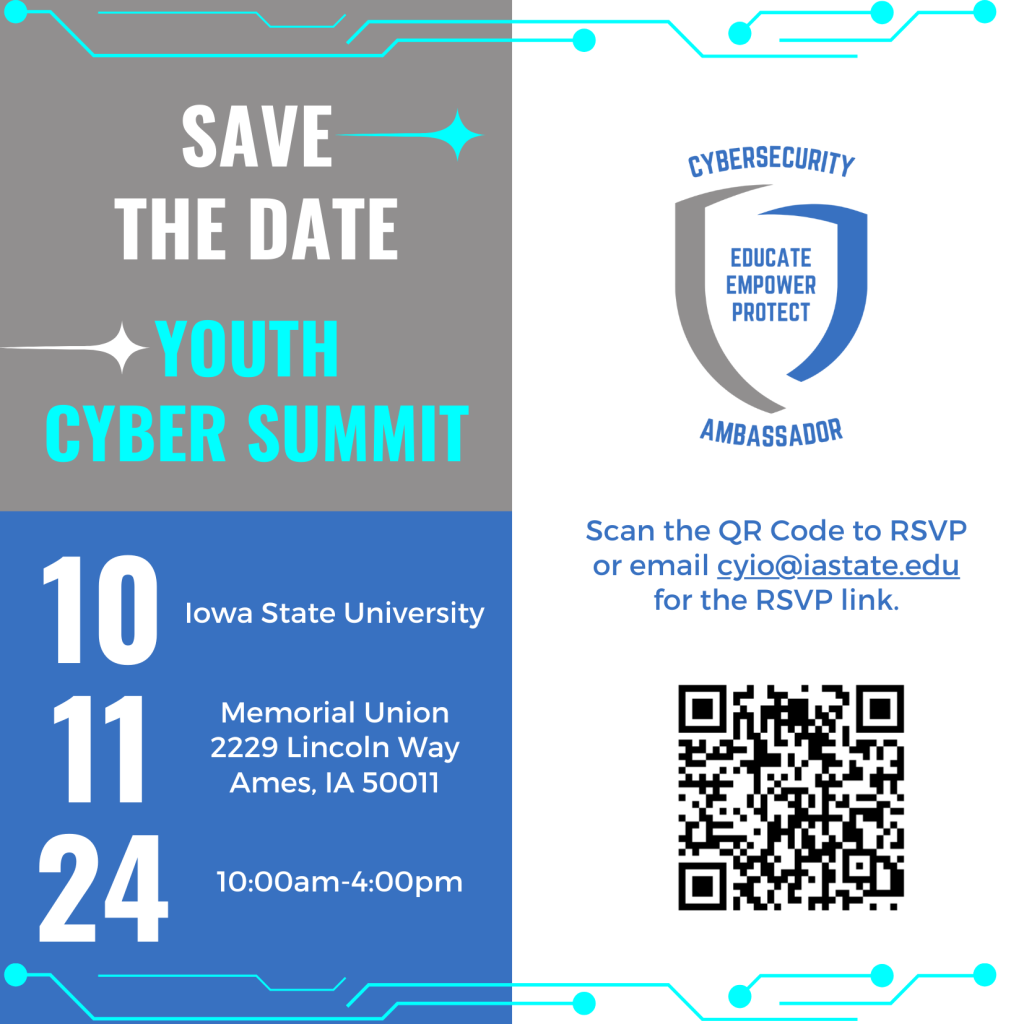Join us for our Youth Cyber Summit on October 11, 2024 at the Memorial Union at Iowa State University from 10:00am-4:00pm! Students will be there to showcase their cybersecurity skills!

Improving Cybersecurity for Iowans
October is National Bullying Prevention Month. The acceleration of online activity and social media use has led to increases in online bullying that affects self-esteem, physical health, mental health, education, and many other facets of children’s lives.
Click here to view a resource guide on allconnect.com. This guide is free and includes the following:
Within the last 18 months, there has been a dramatic increase in cyberattacks in agriculture, food supply, and farming. This is just the beginning as targeting the agriculture sector has been at the forefront of attackers’ minds. Attackers are becoming more creative and targeting sectors that are critical to human life, and farming is a large part of that. Read more: https://www.extension.iastate.edu/agdm/wholefarm/html/c6-59.html
“BOSSIER CITY, La.–(BUSINESS WIRE)–CYBER.ORG – a workforce development organization funded through the Cybersecurity Education and Training Assistance Program (CETAP) grant from the Cybersecurity and Infrastructure Security Agency (CISA) – today kicked off the inaugural National Cybersecurity Education Month in June.” Read more here: https://www.businesswire.com/news/home/20220613005184/en/CYBER.ORG-Announces-Creation-of-National-Cybersecurity-Education-Month-in-June-to-Expand-K-12-Cybersecurity-Education-and-Diversify-the-Talent-Pipeline
Summer is in full swing, so it’s time for travel and vacation. The last thing you want to happen while traveling or on vacation is a cyberattack. Here are a few ways to avoid a cyberattack when traveling.
Both personal safety and cybersecurity measures, posting where you are or where you’re going might alert new opportunities to attackers. For example, posting online that you’re traveling tells attackers that your home is empty. So, your home is vulnerable to any sort of physical attack. This is a cybersecurity issue because the physical threat is enabled by a cyber event.
Public WiFi is sometimes unsafe. If you connect to public WiFi—at an airport or hotel, for instance—avoid signing into websites with sensitive information. Logging in to a website poses a threat to your username and password. Password sniffers—programs and people that monitor the network traffic for login credentials—can detect your credentials and use them to gain access to personal information, such as social media, online banking and other sites.
To prevent this, connect to a virtual private network (VPN) when connecting to the WiFi or connect to a personal hotspot. A VPN will encrypt your device’s connection to the internet. So, even if a password sniffer detects traffic, it would only find encrypted gibberish, not your password. Not connecting to the WiFi or using a hotspot requires cell service, but it is safe.
Unlike your credit card, your debit card is directly linked to your bank account. If your debit card or debit card number is stolen, the thief has access to the money in that account.
If you only use your credit card on your trip, no potential thief has access to your bank account. A thief could surely rack up the balance on your credit card, but your credit card company can help dispute the charges you did not make.
A thief of a debit card or bank account information may spend your actual money and share the bank information with others.
Make sure your cell phone has the appropriate level of protection. Add a passcode or password to protect what is on your phone. This is especially important if debit cards, credit cards, or passwords are stored on it.
If you need to bring your work laptop, phone, or other device with you on your trip, do not allow kids or unauthorized people to use the device to prevent any cyber trouble with work devices. With the amount of sensitive data on work equipment, it is best to separate personal use from work devices.
Using a work device on travel is also a reason to use a VPN. Keep the abundant sensitive data on work devices safe with the protection of a VPN.
These methods of protection can be done before you travel, so you will not have to constantly think about it while you’re on the road, in the air, or in a different area. Enjoy the time away without worrying about the security of your personal information.
For more information and tips on personal cybersecurity, visit www.iowacyberhub.org.
Doug Jacobson was featured on the Successful Farming Podcast to discuss cybersecurity on the farm. Listen here: https://www.agriculture.com/podcast/successful-farming-podcast/cybersecurity-on-the-farm
“The center, which would be located within the Iowa State University of Science and Technology, would focus on training different groups to prevent cyber attacks and deal with active threats.” Read more: https://www.govtech.com/security/iowa-bill-would-create-cyber-simulation-training-center
“Security professionals are urging Americans to take immediate steps to protect themselves from a higher risk of Russian cyberattacks after the invasion of Ukraine.” Read more: https://www.usatoday.com/story/tech/2022/02/28/russia-cyber-attack-ukraine-invasion-protect-yourself/6976490001/
“Most people affected by cyber attacks will wonder why they were a victim of the attack, often asking ‘Why me?’ In many cases, the attack is not targeted at them specifically, but they fell victim to a cyber attack.” Read more: https://online.fliphtml5.com/wdlxw/lqaq/#p=34
Farmers and those employed in the agricultural industry should be mindful of the risks involved with internet security and what they can do to keep themselves and their companies safe.
With so much activity being done online, farmers share the same risks as those employed in other industries – sometimes even more so. Read more: https://ruralradio.com/kuvr/news/cybersecurity-concerns-for-farmers-agribusiness/